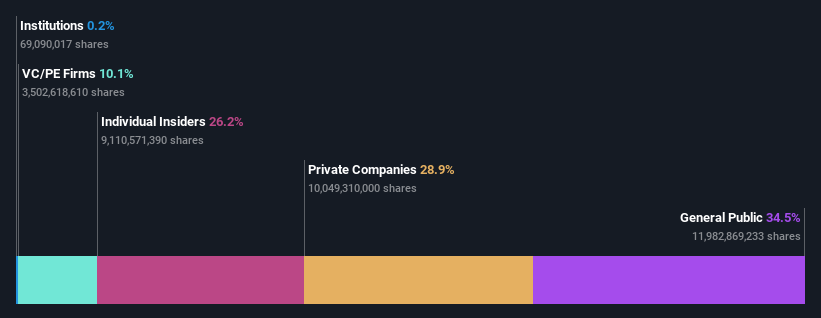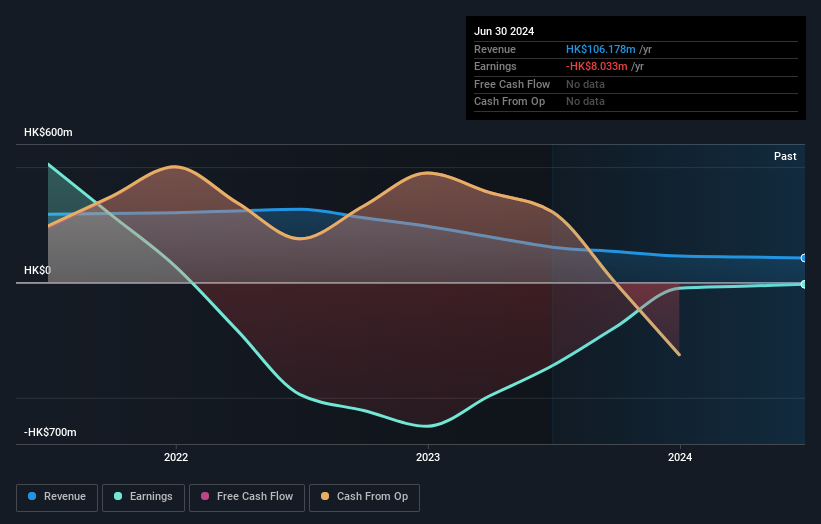- Hong Kong
- /
- Capital Markets
- /
- SEHK:245
China Vered Financial Holding Corporation Limited's (HKG:245) last week's 11% decline must have disappointed retail investors who have a significant stake

Key Insights
- China Vered Financial Holding's significant retail investors ownership suggests that the key decisions are influenced by shareholders from the larger public
- 54% of the business is held by the top 3 shareholders
- 26% of China Vered Financial Holding is held by insiders
A look at the shareholders of China Vered Financial Holding Corporation Limited (HKG:245) can tell us which group is most powerful. With 35% stake, retail investors possess the maximum shares in the company. In other words, the group stands to gain the most (or lose the most) from their investment into the company.
And last week, retail investors endured the biggest losses as the stock fell by 11%.
Let's delve deeper into each type of owner of China Vered Financial Holding, beginning with the chart below.
View our latest analysis for China Vered Financial Holding

What Does The Lack Of Institutional Ownership Tell Us About China Vered Financial Holding?
We don't tend to see institutional investors holding stock of companies that are very risky, thinly traded, or very small. Though we do sometimes see large companies without institutions on the register, it's not particularly common.
There are multiple explanations for why institutions don't own a stock. The most common is that the company is too small relative to funds under management, so the institution does not bother to look closely at the company. On the other hand, it's always possible that professional investors are avoiding a company because they don't think it's the best place for their money. China Vered Financial Holding might not have the sort of past performance institutions are looking for, or perhaps they simply have not studied the business closely.

China Vered Financial Holding is not owned by hedge funds. Vered Holdings Group Ltd is currently the company's largest shareholder with 29% of shares outstanding. Xueyi Liu is the second largest shareholder owning 15% of common stock, and China Minsheng Investment Group holds about 10% of the company stock. Furthermore, CEO Feng Li is the owner of 0.8% of the company's shares.
After doing some more digging, we found that the top 3 shareholders collectively control more than half of the company's shares, implying that they have considerable power to influence the company's decisions.
Researching institutional ownership is a good way to gauge and filter a stock's expected performance. The same can be achieved by studying analyst sentiments. Our information suggests that there isn't any analyst coverage of the stock, so it is probably little known.
Insider Ownership Of China Vered Financial Holding
The definition of company insiders can be subjective and does vary between jurisdictions. Our data reflects individual insiders, capturing board members at the very least. Management ultimately answers to the board. However, it is not uncommon for managers to be executive board members, especially if they are a founder or the CEO.
I generally consider insider ownership to be a good thing. However, on some occasions it makes it more difficult for other shareholders to hold the board accountable for decisions.
Our most recent data indicates that insiders own a reasonable proportion of China Vered Financial Holding Corporation Limited. Insiders own HK$492m worth of shares in the HK$1.9b company. We would say this shows alignment with shareholders, but it is worth noting that the company is still quite small; some insiders may have founded the business. You can click here to see if those insiders have been buying or selling.
General Public Ownership
With a 35% ownership, the general public, mostly comprising of individual investors, have some degree of sway over China Vered Financial Holding. While this size of ownership may not be enough to sway a policy decision in their favour, they can still make a collective impact on company policies.
Private Equity Ownership
With a stake of 10%, private equity firms could influence the China Vered Financial Holding board. Some investors might be encouraged by this, since private equity are sometimes able to encourage strategies that help the market see the value in the company. Alternatively, those holders might be exiting the investment after taking it public.
Private Company Ownership
It seems that Private Companies own 29%, of the China Vered Financial Holding stock. Private companies may be related parties. Sometimes insiders have an interest in a public company through a holding in a private company, rather than in their own capacity as an individual. While it's hard to draw any broad stroke conclusions, it is worth noting as an area for further research.
Next Steps:
It's always worth thinking about the different groups who own shares in a company. But to understand China Vered Financial Holding better, we need to consider many other factors. Consider for instance, the ever-present spectre of investment risk. We've identified 1 warning sign with China Vered Financial Holding , and understanding them should be part of your investment process.
Of course this may not be the best stock to buy. Therefore, you may wish to see our free collection of interesting prospects boasting favorable financials.
NB: Figures in this article are calculated using data from the last twelve months, which refer to the 12-month period ending on the last date of the month the financial statement is dated. This may not be consistent with full year annual report figures.
New: AI Stock Screener & Alerts
Our new AI Stock Screener scans the market every day to uncover opportunities.
• Dividend Powerhouses (3%+ Yield)
• Undervalued Small Caps with Insider Buying
• High growth Tech and AI Companies
Or build your own from over 50 metrics.
Have feedback on this article? Concerned about the content? Get in touch with us directly. Alternatively, email editorial-team (at) simplywallst.com.
This article by Simply Wall St is general in nature. We provide commentary based on historical data and analyst forecasts only using an unbiased methodology and our articles are not intended to be financial advice. It does not constitute a recommendation to buy or sell any stock, and does not take account of your objectives, or your financial situation. We aim to bring you long-term focused analysis driven by fundamental data. Note that our analysis may not factor in the latest price-sensitive company announcements or qualitative material. Simply Wall St has no position in any stocks mentioned.
About SEHK:245
China Vered Financial Holding
An investment holding company, provides asset management, consultancy, financing, and securities advisory and brokerage services in Hong Kong, Mainland China, Japan, and Canada.
Flawless balance sheet minimal.


